After all that, Tokyo appears to have pulled off a pandemic Olympics.
The Tokyo Olympics, which took place in a COVID-19 state-of-emergency in Tokyo, were rightly laden with worry. Public opposition to the Games, which were already postponed a year, ran high locally. Could more than 11,000 athletes, and thousands more journalists and coaches and officials, descend on a city without creating a dangerous public health emergency?
But amid strict protocols and regular tests, the competition went on. Athletes broke world records. The host country, won a record number of medals. When the home teams soar, the Olympics are more fun for everyone—even without fans in the seats.
For Team USA, which led the medal tally in Tokyo, women ruled. At the 2004 Olympics in Athens, U.S. men won 55 medals, and the women took home 40. Now? The women won 66, the men 41. On the final day of competition alone, the U.S. women’s basketball team won a seventh straight gold, the women’s volleyball team took its first-ever gold, and Jennifer Valente won America’s first-ever track cycling gold in the omnium. This flip speaks to the momentum building for women’s sports in the U.S.; the Olympics will only help push this movement forward.
Bouncing from skateboarding to soccer to track and field and more, I saw so much at these Games. Here are my favorite moments.
The Olympic spirit is alive and well
On Sunday in the Olympic Stadium, why were the two high jumpers leaping up and down and embracing each other as if they had both won a gold medal? Because they had. In a display of sportsmanship proving that the often-tired talk of Olympic spirit and unity can be more than an empty slogan, Italy’s Gianmarco Tamberi and Qatar’s Mutaz Essa Barshim agreed to tie for a gold medal rather than deciding the winner in a jump-off. Tamberi lept into Barshim’s arms. “This is a dream,” Barshim said after, “I don’t want to wake up from.”
Skateboarding’s Olympic debut
In its Olympic debut, skateboarding seemed to be all about the good vibes. At least that was the message given off by the first skaters to vie for Olympic hardware in the street and park events—often amid 100-degree heat in Ariake Urban Sports Park. They relished their fellow competitors’ success and said, over and over, that winning medals didn’t really matter. It was all about their presence on the stage: a bunch of kids once seen as misfits and nuisances—”The Craze and Menace of Skateboards”— cried a 1965 LIFE Magazine cover—were somehow in the Olympics. Stoked!
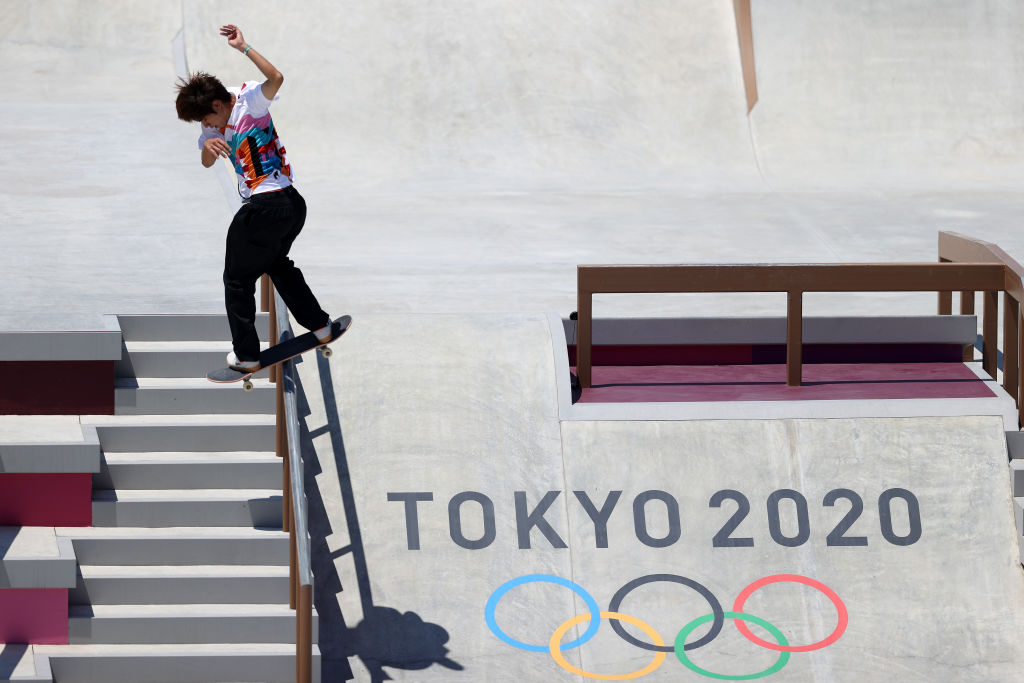
But deep down, the skaters were as driven as anyone else competing in Tokyo and you could tell they really wanted gold around their necks. Heck, Australia’s Kieran Woolley wiped out a cameraman while chasing Olympic glory (he didn’t medal). Where you really witnessed, however, the competitive nature of these debut Olympians was when they landed game-winning tricks. Japan’s Yuto Horigome, who grew up in the area surrounding the Olympic venue where “No Skateboarding” signs remain common, body-slammed his board after clinching the street competition. Australia’s Keegan Palmer slammed his board after landing a kickflip body varial 540—he basically spun the board under his feet while doing three full aerial rotations. And once it was official, he punted his helmet for good measure.
I scream, you scream
At skateboarding, the finals started around high noon. Shade was scarce. Sweat and sunburn were plentiful. Most venue media centers offered some water and bananas and light snacks to help sustain reporters through the heat. At skateboarding, however, workers went above and beyond. They distributed ice packs to rest on your necks. And sunblock. And in a true MVP move, the skateboarding officials filled a freezer full of ice cream that journalists could at grab at will. They turned us all into giddy children.
You had to down it quick, though—the Tokyo sun spared no cone.
READ MORE: Sleepless Nights, Hotel Room Sprints, So Much 7-Eleven: What It’s Like to Cover the Tokyo Olympics
McLaughlin hurdles over the hype
One perk of covering track and field: the press seats right by the finish line. Anticipation builds as the runners make the final turn, heading right toward you. The women’s 400-m final was a marquee event, thanks to a showdown between two Americans: Dalilah Muhammad, 31, the defending Olympic and world champion, and Sydney McLaughlin, who just turned 22, an athletic prodigy: she’s still the only person to be named Gatorade High School Athlete of the Year two years consecutively. While most track-and-field events were held at night locally, and in the morning for those on the U.S. East Coast, this race was set for 11:30 a.m. local time on Aug. 4—which was East Coast prime time the night before.
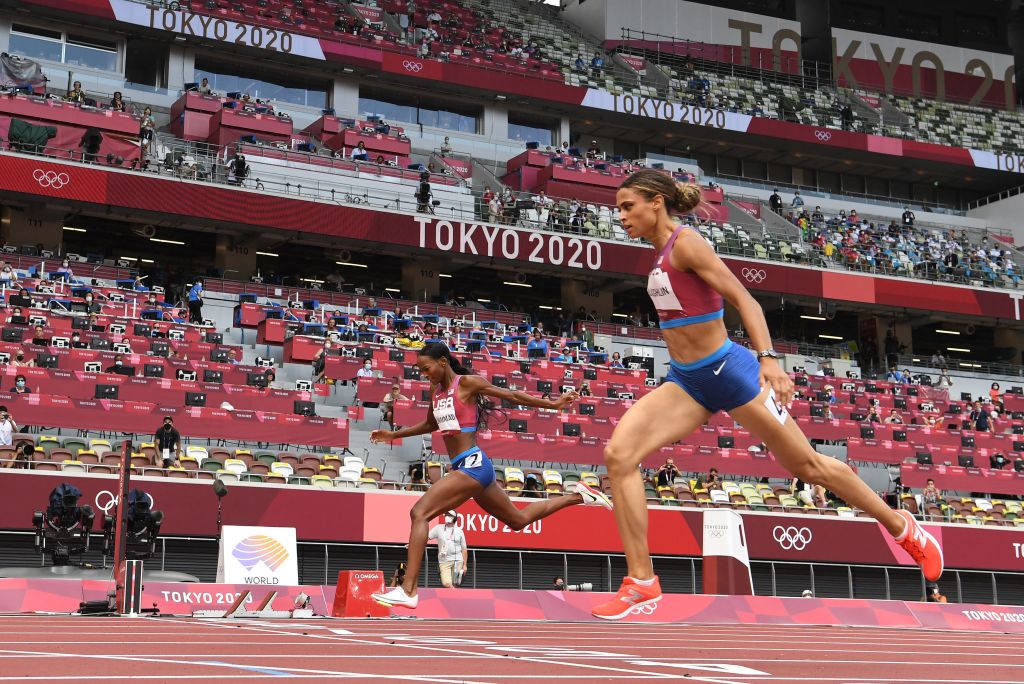
The duel more than lived up to the hype: Muhammad took off early and led most of the way. But after the final hurdle, it was anyone’s game. On the final 40-m sprint, McLaughlin pushed and pushed and crosses the finish first, with a time of 51.46 seconds, beating her own world record set at the U.S. Olympic Trials. Muhammad ran the second-fastest time in women’s 400-m hurdles history.
You couldn’t ask for anything more. After it was over, McLaughlin seemed more exhausted and relieved than joyous. Can you blame her?
World’s fastest… who?
If there’s one Summer Olympics event for which I make a point of showing up hours in advance, it’s the men’s 100-m dash. Why? First, to jockey for one of those prime finish-line seats. And second, if a bus breaks down on the way to the track stadium and you’re running up against the start, the Olympics isn’t going to delay the 100-m for you. And it’s over in a blur.
For the past three Olympics, the race was a showcase for Usain Bolt. With the legend retired, the race in Tokyo felt even more intriguing: who would succeed Bolt as Olympic champion, and be crowned the new “World’s Fastest Man?” Maybe Americans Trayvon Bromell or Fred Kerley? The last time Bolt wasn’t in this race, at Athens in 2004, Justin Gatlin of the U.S. finished first.
The gun goes off. I had my finish-line seat. As the runners approached the line—wait, who the heck is that in front? A sprinter from Italy? His name is… Lamont Marcell Jacobs?
I’m not afraid to admit I’d never heard of him because his competition said the same. “I don’t know anything,” said Canada’s Andre de Grasse, who finished third in the 100 m for the second straight Olympics (He’d fare better in the 200 m three nights later, finally winning gold). I happened to be sitting between Italian journalists: they were also dumbfounded and started celebrating.
American writers had to wait nearly two hours to talk to Jacobs, as he conducted his interviews with Olympic TV rights holders from around the world. When you’re the world’s fastest man—and people want to ask where the heck you came from—you’re a man in demand. When he finally came to us, I asked him if there was anything he wanted Americans to know about him. Thankfully, he delivered a little humor. “Hey, here I am,” he said, waving. “I am here.”
Turns out he was born in El Paso, Texas, before moving to Italy with his mom when he was six months old. On Friday, he won another gold as Italy took the 4×100-m relay gold. However, as is common in track and field, doping suspicions soon arose: Jacobs’ former nutritionist is reportedly under investigation for distributing steroids. The sprinter said he split from the nutritionist in March, as soon as he found out about the probe.
Carissa Moore’s golden moment
For a break from the Tokyo urban bubble, on July 27 I made a spot decision to hop on the bus from the main press center—where stale air is the defining feature—to take a two-hour bus ride east of Tokyo to the Tsurigasaki Surf Beach, where the sport was making its Olympic debut. The finals were supposed to be the next day, but a tropical storm was threatening a washout; according to my quick calculations, I could get there in time for the final.
Covering the Olympics is all about making smart bets. Thankfully, I made the right one here. As Hawaiian Carissa Moore hit the water for her final, a rainbow appeared on the horizon. It was a good sign for Moore: she glided on the crests of her waves, twisting and turning and staying on her board, clearly out-performing her opponent, South Africa’s Bianca Buitendag, who couldn’t have been more gracious afterward. “She’s the most significant female surfer in the world,” said Buitendag of Moore. “And has the most impact.”
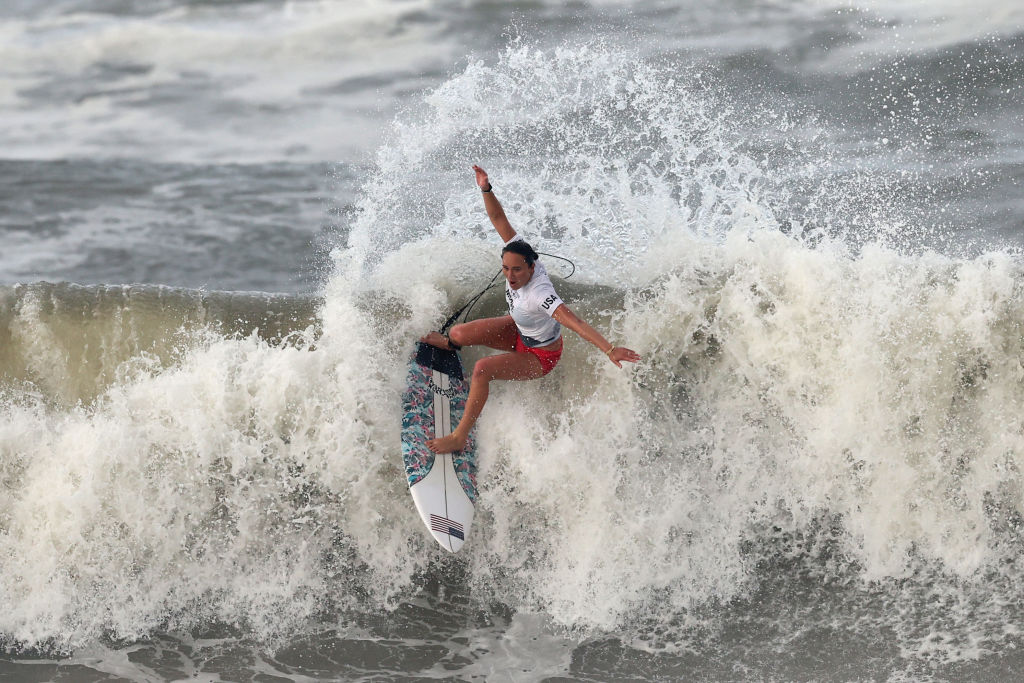
I won’t be able to pull off such a spontaneous move in Paris 2024: the surf venue is in Tahiti. Unless dear editors, how does TIME surfing correspondent sound?
Another reason to remember surfing: on the bus ride back, I saw the alert that Simone Biles had pulled out of the team event final. Her decision, to put her mental and physical well-being above competition, single-handedly changed the focus of these Games—and hopefully their legacy.
Read more: How the Tokyo Olympics Changed the Conversation About Athletes’ Mental Health
Noah Lyles opens up
Noah Lyles, the defending 200-m world champion and an Olympic favorite in this race, kept the mental health conversation going after he finished a disappointing third in the 200. Reporters in the mixed zone where athletes and journalists interact expected a routine conversation, centered around Lyles’ disappointment, analysis of what went wrong, and future plans. The session began that way. “Boring,” he said about his bronze.
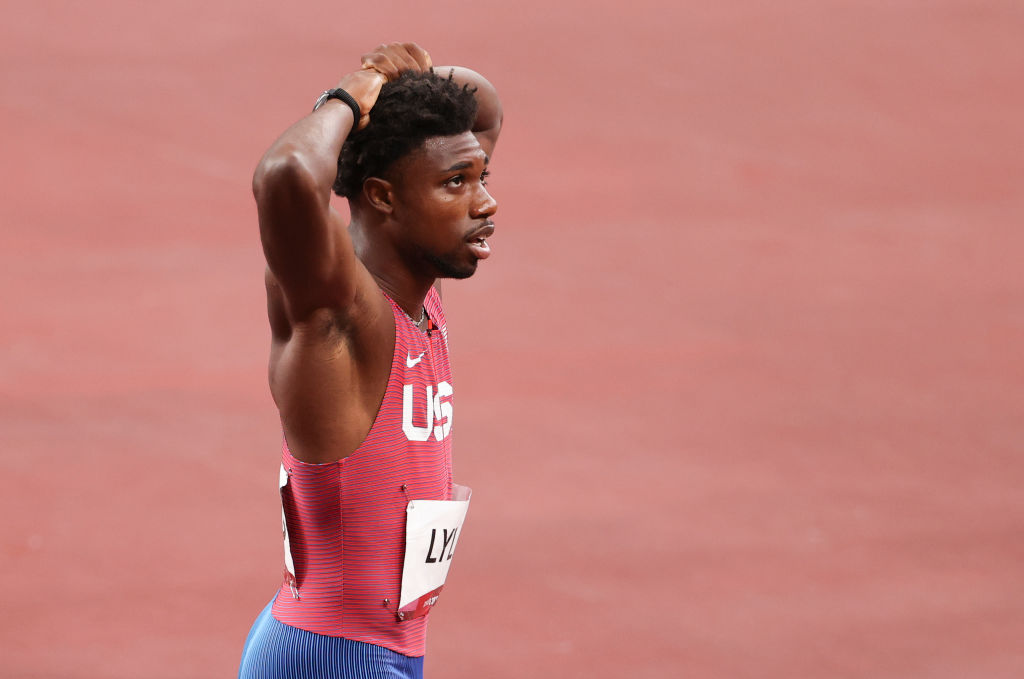
A few minutes in, however, Lyles started to cry as he discussed feelings of guilt. He wished older brother Josephus, an elite sprinter who failed to qualify for the team, was also in Tokyo. “I feel like this wasn’t even my dream,” Lyles said. “In 2012, my brother had the dream that he was going to come to the Olympics. I really just tagged along for the ride.” He also talked about the challenges of going on, and off, antidepressants. He said he hopes the conversations about mental health awareness don’t fade when the Games end.
Lyles also delivered one of the best quotes of the Olympics. “I am not defined by being an Olympic bronze medalist, or a world champion, or the high schooler that went pro,” he said. “That’s not who I am. I’m Noah Lyles. I’m not Usain Bolt’s successor. I’m not Andre de Grasse’s successor. I’m nobody’s successor. I am me. And that’s who I’ll always be.”
Driveway ball goes big-time
An Olympic revelation that I hope is here to stay: 3-on-3, or technically, 3×3, basketball. And it’s not just because I’ve played a non-Olympic playground version my whole life. Rather it’s because they imported that fast and furious, informal park vibe to the Games. At 3×3, you’ve gotta shoot in 12 seconds. Games are brief, just 10 minutes. A DJ plays silly music (Why is Joan Jett blaring? Where did this playlist come from?) It’s fun and easy to follow.
First Lady Dr. Jill Biden even checked out the U.S. women’s team, which went on to win gold, on the first day of competition (Secret Service whisked her away before I could get a question in).
Allyson Felix delivers
Remember when we were discussing bets? Here at TIME, we knew Allyson Felix’s story was compelling: a spectacular runner defined solely by her performance at the track, Felix found her voice off of it in the final lap of her career—as a mother who overcame a life-threatening emergency C-section to juggle parenthood and competition, as an advocate for equity in maternal health care, as an athlete who publicly criticized the pregnancy policies of her sponsor and most powerful entity in her sport, Nike.
In the spring, we chose her for one of our Olympics issue covers. I spent time with her at home and in training in Southern California. We did a photo shoot and video interview. Now all she had to do was make the U.S. Olympic team, one of the most difficult tasks in sports.
READ MORE: Motherhood Could Have Cost Allyson Felix. She Wouldn’t Let It
The U.S. Track and Field trials are notoriously difficult; finish in the top three, you’re in. Feeling a little subpar the day of your race? Odds are, you’re out. Felix, 35, was going up against runners at the peak for their careers. She was raising a young daughter and busy trying to launch a new company.
Sure, she had won nine Olympic medals dating back to Athens in 2004. But at the last U.S. championships, in 2019, Felix finished sixth in the 400 m. The pandemic canceled many of the usual track and field competitions that allow analysts to gauge how runners are performing before the Games; Felix was a wild card.
Boy did she deliver. Felix made a late push in the 400 m at to finish second and qualify for her last individual Olympic race. Still, expectations in Tokyo were muted.
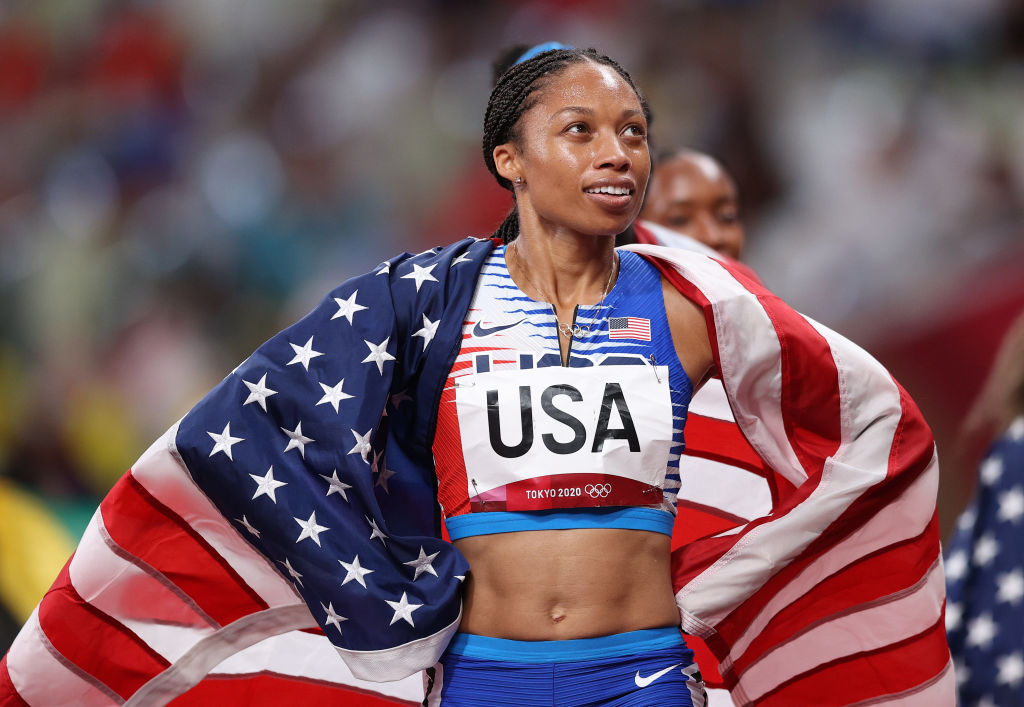
In the Tokyo 400-m final, she kicked up each of her legs before the start. She gave a little grin as she crossed the finish line, knowing she won bronze to become the most decorated female track-and-field athlete ever. “It’s really hard for me, when I don’t win, to still have joy,” Felix said afterward. “Tonight I have joy.”
Thanks to her individual race, on the next night, Aug. 7, the U.S. coaches put Felix on its all-star 4×400-m relay team with McLaughlin, Muhammad, and Athing Mu. Felix ran the second lap; the Americans cruised to win gold.
“I am absolutely where I’m supposed to be,” she said following the race, which put her ahead of Carl Lewis as the most decorated American Olympic track athlete of all time.
Felix crushed expectations. Tokyo pulled off an Olympics. The Tokyo Games were odd and unprecedented.
But the efforts of the athletes, and the people of Tokyo, will never be forgotten.
Read more about the Tokyo Olympics:
More Must-Reads From TIME
- The 100 Most Influential People of 2024
- Coco Gauff Is Playing for Herself Now
- Scenes From Pro-Palestinian Encampments Across U.S. Universities
- 6 Compliments That Land Every Time
- If You're Dating Right Now , You're Brave: Column
- The AI That Could Heal a Divided Internet
- Fallout Is a Brilliant Model for the Future of Video Game Adaptations
- Want Weekly Recs on What to Watch, Read, and More? Sign Up for Worth Your Time
Write to Sean Gregory/Tokyo at sean.gregory@time.com